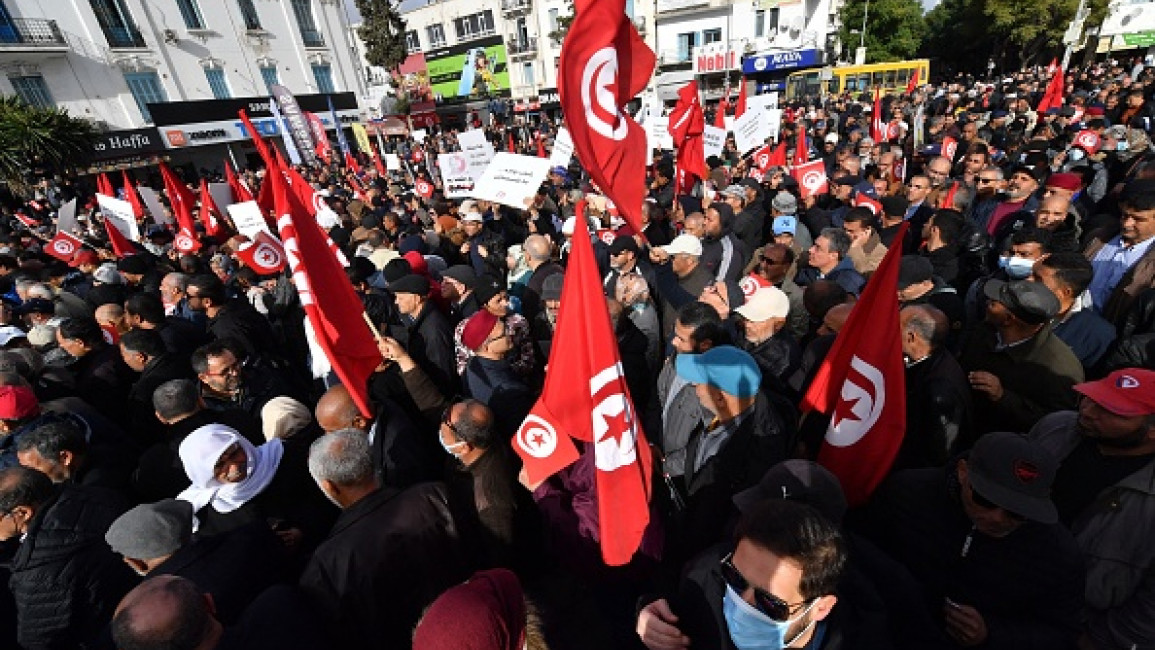Children of jailed Tunisian political figures want Kais Saied investigated
At the Hague, children of imprisoned Tunisian political figures gathered Thursday to bring justice to the less-known political prisoners and abused black migrants amid the ongoing authoritarian and racist crackdown in the country, Yussra Ghannouchi, daughter of imprisoned opposition leader Rached Ghannouchi, told The New Arab.
"We are not here only for our parents. We are also for the less-known detainees whose stories did not make the news. Those who were arrested over a social media post or for merely expressing disaccord with the current policies," Yussra Ghannouchi told TNA.
Four children of political prisoners in Tunisia, Yussra Ghannouchi, Elyess Chaouchi, Jaza Chrif (son of Chaima Issa) and Kaouther Ferjani, held a press conference at the Hague after they petitioned the International Criminal Court (ICC) to investigate claims of political persecution and human rights violations by President Kais Saied's administration.
"There's no justice in Tunisia today. It is only a tool to prosecute the dissidents and silence the opposition," said Yussra Ghannouchi, daughter of the imprisoned 82-year-old opposition leader, explaining why they took their quest for international justice.
Ghannouchi, who was the speaker of the parliament before the president shut it down, was arrested in April over "inciting statements" and sentenced a month later to one year in prison.
According to his family, Ghannouchi was denied family visits and suffered throughout the hate wave that struck Tunisia in August. "police broke into the flat of my sister in Tunisia, and they searched my other sister’s house," Youssra told TNA about the harassment her family facing in Tunisia since her father's arrest.
ندوة صحفية لعائلات المعتقلين السياسيين https://t.co/SnW7QZbYMf
— غنوشي لست وحدك (@FreeGhannouchi) October 5, 2023
Her father was on a three-day hunger strike earlier this week, following the steps of Jawhar Ben Mbarek, the head of the leading anti-Saied coalition, who continues his open-ended hunger strike.
Seventeen other prominent dissidents have recently staged hunger strikes from prison, with several still ongoing, including Ghazi Chaouachi.
Chaouachi, a prominent critic of Saied, was arrested amid February’s crackdown, deemed a political witch hunt by Amnesty, on dissents that targeted more than 20 people, including opposition politicians, activists, protest organisers, media figures, judges and influential businessmen.
His son Elyess told TNA that his father was denied the right to read books or go to the library as "he is being treated as a terrorist and a danger to other prisoners."
“He is being subjected to psychological torture. He is denied family visits and continually subject to camera surveillance without his consent,” added Elyess in his interview with TNA.
According to his son, Chaouachi, who was arrested over “conspiracy against the state, " might face up to death or a life sentence.
Today we (@yusraghkh @TG_Chambers @JazaCherif89, myself & Elyes Chaouachi) filed a case was filed at the ICC in The Hague asking for an investigation to be opened into the crimes committed by the Tunisian Government. pic.twitter.com/wHrz8IwqC1
— Kaouther Ferjani (@TheKaouther) October 5, 2023
Meanwhile, Elyess said he paid dearly for defending his father as he is now living in exile and might get sentenced to three years in jail if he ever came back to Tunisia.
“My mother, who is a judge in Tunisia, was suspended from work for two weeks, but they could not find anything on her,” he added as he spoke on the harassment his family had experienced in the past months.
The relatives of jailed opposition figures have also noted the increasing number of opposition voices being arrested and alleged a campaign of persecution against Black migrants throughout Tunisia.
At least 42 prominent figures have been jailed. Many face sweeping charges of conspiracy and endangering state security.
The case has been brought under Article 15 of the court's Rome Statute, which allows the prosecutor to investigate on its "own initiative," bypassing the need to obtain a referral from a member state or the United Nations Security Council.
The family members made a similar case to the African Court on Human and Peoples’ Rights earlier this year and have also petitioned the United States and the United Kingdom for sanctions against the Tunisian government, namely President Saied and his Justice and Interior ministers.
Though they're a significant channel for the ICC, few cases progress to the level of extensive investigations.
Still, the petition at the ICC is intended to draw further attention to Tunisia’s increasingly repressive political landscape since Saied expanded his powers, froze out the parliament, ruled mainly by decree, and rewrote a controversial constitution.


![Minnesota Tim Walz is working to court Muslim voters. [Getty]](/sites/default/files/styles/image_684x385/public/2169747529.jpeg?h=a5f2f23a&itok=b63Wif2V)




![Debris near Rafic Hariri International Airport [Getty]](/sites/default/files/styles/image_330x185/public/2176162423.jpeg?h=a5f2f23a&itok=MCSK9mkM)
![An Israeli air strike on Jabalia killed teenage journalist Hassan Hamad [Screengrab/X]](/sites/default/files/styles/image_212x120/public/2024-10/hassan%20hamad1.jpg?h=c12e0b96&itok=KstD_5xk)
